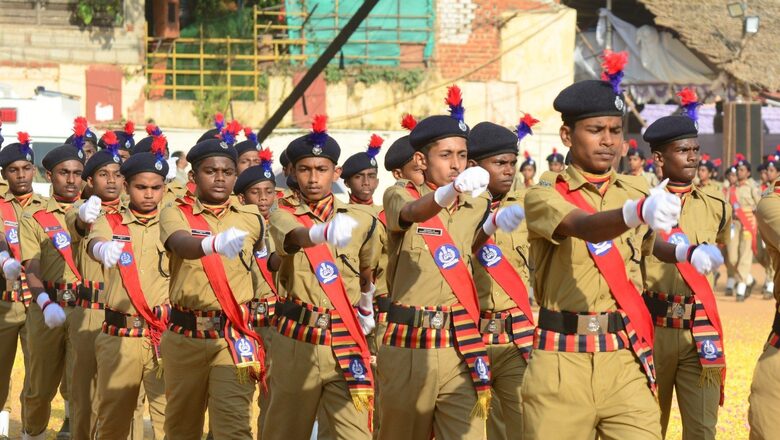
views
The Centre’s Agnipath scheme for recruitment into the armed forces was formulated in the national interest, with a laudable objective of maintaining national security, the Delhi High Court said on Monday while making it clear that it will not interfere with policy decisions.
The court dismissed a batch of petitions assailing the validity of the scheme while terming it a “well-thought” policy decision of the Centre.
Besides the pleas challenging the Agnipath scheme, the court also rejected a bunch of petitions relating to the recruitment process in the armed forces under certain previous advertisements while clarifying that such candidates do not have a right to seek recruitment.
Dismissing the pleas relating to the previous advertisements, the bench said the Agnipath scheme is in “public interest” and the aspirants cannot claim any right to seek recruitment on account of their participation in the processes initiated under notifications issued prior to the introduction of the new policy.
A bench of Chief Justice Satish Chandra Sharma and Justice Subramonium Prasad said it does not find the scheme to be “arbitrary, capricious or devoid of reason” and policy decisions with regard to national security are taken after a careful consideration of the country’s socio-political scenario, along with the socio-political scenario of the neighbouring countries.
It said policy decisions with wide-ranging implications on the nation’s health and security should be decided by bodies best suited to do so and it appears that the government has been considering for long the possibility of creating armed forces that consist of more youthful, agile and physically-adept individuals.
Dealing with 23 petitions, the bench said the government’s objective is neither discriminatory nor mala fide or arbitrary, and the court finds no reason to interfere with it.
The Agnipath scheme, unveiled on June 14 last year, lays out the rules for recruitment of youngsters into the armed forces.
According to the rules, those aged between 17-and-a-half and 21 years are eligible to apply and they would be inducted for a four-year tenure. The scheme allows 25 per cent of them to be granted regular service subsequently. After the scheme was unveiled, protests against it erupted in several states.
Subsequently, the government extended the upper age limit to 23 years for recruitment under the scheme in 2022.
“We have extensively gone through the Agnipath scheme and can conclusively state that this scheme was made in national interest to ensure that the armed forces are better equipped,” the bench said.
Regarding the petitions on the previous advertisements for recruitment, the bench observed that the court cannot bind the government to its earlier policy decision and a recruitment process can be changed midway if public interest is involved.
The objective of the scheme is to reduce the average age of the forces to make those “leaner, agile and will be greatly beneficial for border security” and such objectives cannot be said to be arbitrary, whimsical or mala fide, it said.
“It has also been stated that the impugned scheme, by reducing the average age of soldiers, will bring our armed forces at par with other nations, as the average age of armed forces across the world is 26 years. The stated objective of the impugned scheme is to have a blend of young jawans, sailors or airmen between the age of 18-25 years as agniveers, supervised by an experienced regular cadre having the age of 26 years. To achieve this goal, the State has also been consistently decreasing the age bracket of officers,” the court said in its 55-page verdict.
It said the scope for judicial interference is further constrained when a scheme or policy decision pertains to national security, adding that the present issue — recruitment of soldiers into the armed forces — most definitely qualifies as one falling under the ambit of “national security”.
“It is exceedingly clear that this court does not interfere with policy decisions pertaining to national security in normal course, as this court is not best placed to take such decisions,” the bench said.
It said rather than focusing on the alleged “political motives” behind the scheme, it is necessary to focus on the benefits offered by it.
It noted that the “agniveers” who are not recruited into the regular Army would be given skill certificates that will enable them to get employment in the private sector.
“Considering the fact that the laudable objective of maintaining national security is at the heart of the impugned scheme, this court does not find it arbitrary, capricious or devoid of reason,” the bench said.
“The material on record also discloses that the impugned scheme will not only provide an opportunity to youth to serve the country but will also result in the armed forces having the most capable individuals, who will be rewarded with a decent financial package and a bright future,” it said.
Several petitioners, who sought recruitment under the Common Entrance Examination (CEE) and a 2019 notification for the Indian Army and Air Force respectively, had approached the high court with a grievance that the recruitment processes for several posts were halted at the “fag end” and subsequently, cancelled on account of the introduction of the Agnipath scheme, which effectively nullified their recruitment.
The court rejected the petitioners’ contention that they lost opportunities and suffered on account of the sudden change in the policy and said the government, in this case, cannot be held to be bound by the recruitment process initiated by it.
“There was no vested right in claiming appointment even after a selected list has been declared and secondly, on account of the larger public interest weighing strongly in favour of the Agnipath scheme. The petitioners have no vested right to seek such recruitment and secondly, that promissory estoppel and legitimate expectation find themselves severely restricted by the overarching concerns of public interest,” the court said.
Read all the Latest India News here

















Comments
0 comment